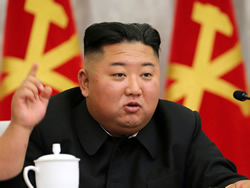Travis Bradberry* says there are lessons in leadership that can be learned from history’s greatest heroes — and its worst tyrants.
 Leadership is a journey of self-discovery and learning.
Leadership is a journey of self-discovery and learning.
Leadership lessons typically come from celebrated cultural icons, whether they work in business, politics, or the arts.
That doesn’t mean that we can only learn from our heroes.
In fact, we can learn just as much about leadership from those who’ve failed us, if we only dare to look.
By looking carefully at some of the questionable qualities of the world’s more suspect leaders, we can gain a deeper understanding of why certain things don’t work.
How our actions affect people, and how we can use influence to inspire growth, not destruction.
When it comes to North Korean dictator, Kim Jong Un’s leadership, there’s a lot to criticise, but that also means there’s a lot to learn.
His actions have plenty to teach us about leadership — you just have to know where to look.
Here are four important lessons that I’ve gleaned from watching the Supreme Leader.
Don’t fear those who might have something to teach you
Great leaders realise that there is always more to learn; weak leaders try to nullify any evidence that somebody else might have more wisdom and experience than they.
Kim falls into the latter category.
One South Korean official said that he is trying to “erase all traces of his father’s rule” and is “replacing top brass with officers who are loyal to him alone”.
Three men who were handpicked by his father to groom the young leader have either been demoted or disappeared entirely.
Also gone are three Defence Ministers and four Chiefs of the Army’s General Staff.
Like weak leaders everywhere, Kim has a habit of pushing people out who might have something to teach him.
This behaviour stifles good ideas and sends everyone who isn’t trapped by a heavily armed border packing.
Don’t alienate your allies
Great leaders know that they need sound allies.
They cultivate these relationships as one of their most valuable business assets and consider them carefully when making important decisions.
Although China has been one of North Korea’s staunchest allies, Kim’s lack of consideration for its interests has been a major strain on their relationship.
One of China’s biggest aims is to maintain stability on the Korean peninsula.
Kim’s provocative solo manoeuvres, including widely publicised missile tests, have irked the Chinese and threatened that stability.
Leaders who go rogue and make major decisions without considering the input of their allies are tough to work for and even harder to trust.
They often find themselves without any support when they need it most.
Don’t annihilate your enemies
Strong leaders don’t fear dissent because they’ve done the hard work to inspire genuine loyalty.
Weak leaders see anything short of pandering as a threat, and they’ll do whatever it takes to quash the threat.
After Kim’s Defence Minister nodded off during a meeting a couple of years back, Kim had him executed.
Naturally, Kim had the execution conducted in front of hundreds of onlookers.
In all, Kim is thought to have executed more than 70 ‘dissenters’ since coming to power.
Like many errant leaders, Kim sees an excessive show of force as a sign of strength that will teach people a lesson.
In reality, it shows weakness and fear.
Sure, many who witness the act will toe the line, but only as long as they absolutely have to.
They know that their leader has poor character, no self-control, and an utter lack of self-confidence.
Whenever a leader engages in verbal abuse, temper tantrums, and harsh punishments that don’t fit the crime, people are quick to look for the door.
Your people are not your pleasure squad
Great leaders believe that they are there to serve their people.
Bad leaders try to twist things the other way around.
Kim is known for maintaining a ‘pleasure squad’ who are forced to live with him and submit to his every whim in exchange for a $4,000 salary and home appliances.
It’s demotivating and demoralising any time you feel as though you’re only worth your pay-check when you’re at a leader’s service.
Great leaders see their position as having additional responsibility to serve those who follow them, to motivate them, and to help them achieve more than they ever thought possible.
Great leaders find lessons everywhere they look as their journey continually moves them towards greater self-awareness.
While our heroes have a lot to teach us, so do those who fail to earn our respect.
Which of history’s other tyrants can teach us valuable lessons about leadership?
*Travis Bradberry is the co-author of the bestselling book, Emotional Intelligence 2.0, and the co-founder of TalentSmart. He can be contacted at TalentSmart.com.
This article first appeared on the TalentSmart website.











